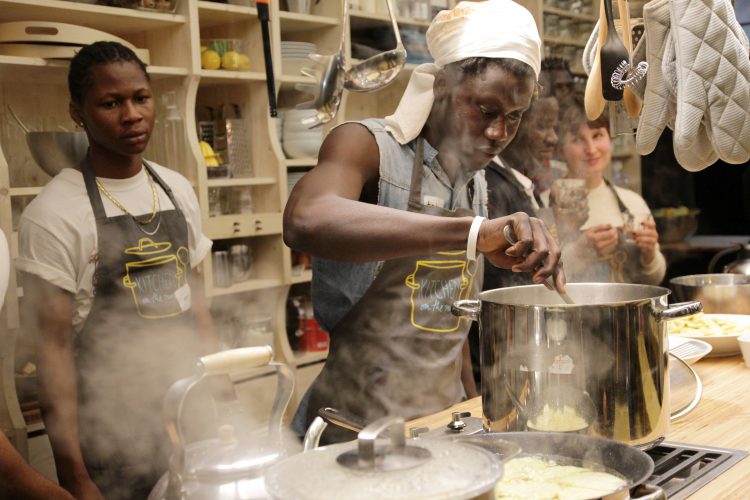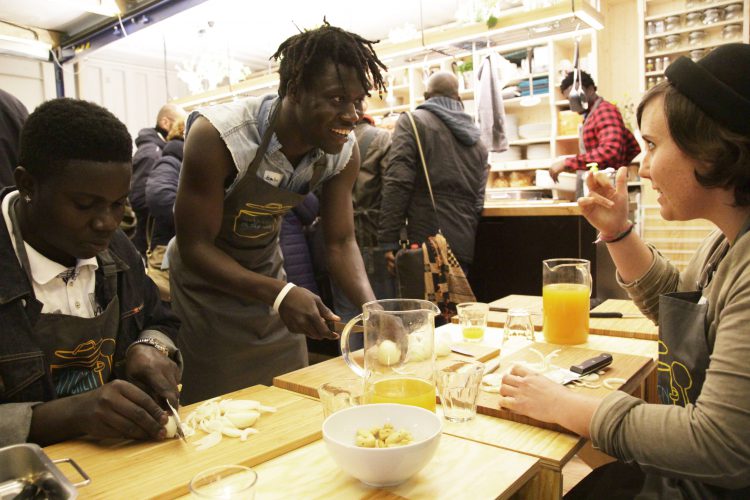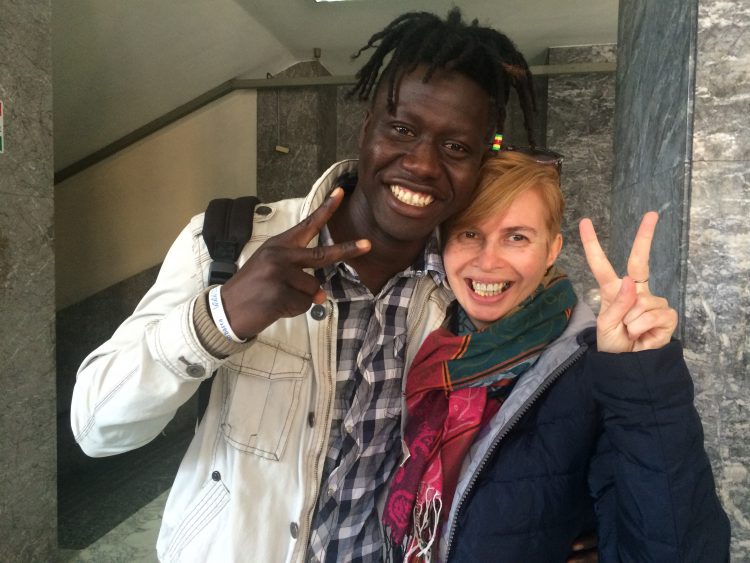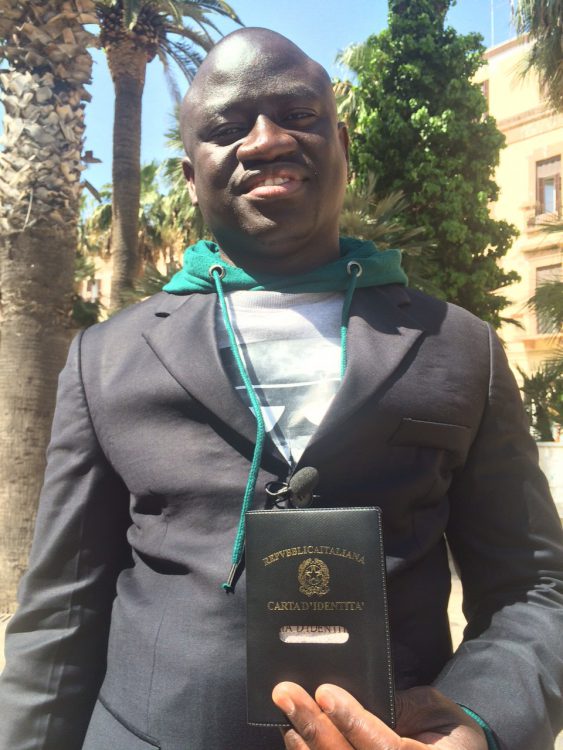He was one of our first guests in our container and cooked “Jollof Rice” for the whole group: Babu, a 20 year old guy from Gambia stood beamed in a denim vest behind the gas stove. One small colored pearl in his rasta curl, which always fell into his forehead, bobbing in the mist, as he fried chicken legs and wreaked the food with a wide grin on the plates. He was our chef of the first hour – a month later he even helped us in the degradation of the container, as if he also had a permanent team member. We did not even question whether Babu should be there at all. But the Italian justice see this differently.
One day in spring Babu needs to go for his asylum hearing. The courthouse in Bari is a concrete block in the noisy downtown. In the atrium Justizia should weigh blindfolded what is legal and what is not. But how righteous is life? Babu came to Bari as an underage refugee. When he was registering, he stated that he was already 18. A strategic mistake, Babu did not know better. Now it is harder to get a residence permit because of this. But in Gambia there is a tyrant, there are many reasons to leave this country. Will he be allowed to stay?

The day before Babu played football at the kitchen container with the other guys of the “Mama Africa”. He shot three goals, ripped his muscular arms in the air. He usually knows where to put his strength: he plays the drums, he juggles. And Babu loves reggae music. But that day of his hearing Babu is scared. He hardly slept, got up at five and prayed three hours in the morning to Allah. As Babu is finally allowed to enter into the wood-paneled courtroom, the young black man has palpitations. Given the marble columns around him he himself becomes one.
This day is important, because he no longer wants to wait. The waiting is the worst, he says. Not knowing whether he can stay in Italy or not. The last time his application was rejected. He filed an appeal. The salary of the laywer he stutters in rates.

Babus greatest happiness is at his side at the court: Marina. The woman, all just call Mama Africa in Bari. The little blonde Italian woman tugs at Babus curls. Piccolino, she calls him, my little one. Actually Marina is a translator, but she has long since adopted a different role. She accompanies refugees and therefore built an organization. Today she fights for her Piccolino – in denim skirt and purple pantyhose. “I am like a mother to the boys, I want to help them to live their dreams”, she says.
Marina enumerates Babus integration achievements: He has a side job as a gardener, he plays football in the team, he is part of the group of Mama Africa, he cooks once a month for all. His Italian? Well, that’s fairly bad, even his lawyer knows that. But now Babu has another plus on the list: He has cooked with Kitchen on the Run. Babu says, hat he would like to be a chef someday.
At the end of the hearing, Babus face is relaxing, a grin is spreading. The waiting has an end – for the next two years: he obtains a permit for two years in Bari. Babu laughs and tells: “I am free now.” Finally he is able to travel and move freely. But later, Babu ist going to say an irritating sentence: “Now I can visit my family in Gambia!” Babus says, that he is homesick. He misses his mother, his family. Although he knows that he does not want to go back to cook in the country where he already met with 8 years Jollof Rice.

The story of Babu could stop here. But it is worth to follow him a little through Bari downtown. At the station, where the car horns and the scooters meander through the queues of waiting people, Babu and Marina meet again an old acquaintance: Jukunda Kebbeh, a compatriot and Babus model. He wears a sport coat, including a green hooded sweatshirt, including a black sweater and congratulats Babu for successful negotiation. He knows the procedure, he has passed it himself and is now three steps further.
The only 23-year-old Gambier his story by walkin through the Old Town: He was chairman of the opposition party in Gambia. He made speeches, sometimes for hours. But the more successful he was politically, the more vulnerable he also lived. He had a friend in the police who finally warned him. Jukunda decided to leave the country: Senegal, Mali, Burkina, Libya – the stations of his odyssey. 2013 he arrived in Lampedusa.
He spent three days and nights on a boat in the Mediterranean Sea. From the second day his biscuits and water were used up, he gave most of his Proviants to the captain. He knows exactly: He just hatd a luck. The big ship that saw Jukunda after two inflatable days, had an Italian flag. “Would it have been the Libyan flag, we would now all dead or in jail” says Jukunda.

“In Libya two 13-year-old robbed me and took away my phone and my last 300 dinars. Then I had to start from scratch again. A man helped me, he gave me a little money on credit. Then I bought a jackhammer. If you have a tool, you are able to work. After two weeks I had repaid him the money. After six months, I finally had enough together to pay a ship to Europe.”
Jukundas uncle shippes container with furniture to Africa from the Port of Hamburg. He therefore sends Jukunda to Austrian flea markets – to find new things. He sends the African interested a picture of it via Whatsapp. 21 days the containers takes from Hamburg to Dakar to Banjul Gambian port.
Babu, Marina and Jukunda are walking through Bari, passing the Basilica of Saint Nicholas, until an old lady from Romanian aks them for money. She points to her old broken body, gesticulates wildly, expressing hunger. Jukunda, the man who was almost choked by the Mediterranean Sea, gives her his last 70 cents from his pocket.

